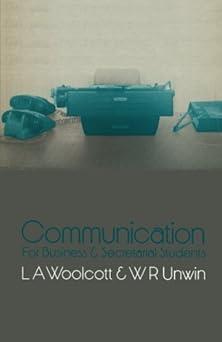Read the following passage carefully and then answer the questions below. The job of secretary, at least
Question:
Read the following passage carefully and then answer the questions below.
The job of secretary, at least in its present form, is a comparatively recent innovation - there is no mention of female secretaries in the world of Dickens, where all correspondence was written in a copperplate hand by male clerks. When 'lady typewriters', as they were termed, first appeared in offices towards the end of the last century they were viewed with the utmost suspicion. The commercial teacher who initiated me into secretarial skills had, in her early days, regularly been chaperoned by her employer's mother while taking dictation. Women were required to wear hats in the office (they were obviously not expected to stay long!) and even in the 1940s it was common to find the secretarial ladies encased in long-sleeved shapeless overalls so as not to distract the gentlemen.
It was after the 1914-18 War that secretaries as we know them today began to enter the office scene. The male secretaries of that time looked on their jobs as stepping stones to executive positions; the women secretaries on the other hand were redoubtable ladies, unmarried of course, devoted to the boss, loyal to a fault, single-minded in their work to the nth degree - a phenomenon that emerged as a direct result of the war "'ith its millions of casualties and it~ remnant army of women who had their only emotional outlet in work, and who created an environment for themselves which gave them some sort of fulfilment.
The 1939-45 war in its turn had the opposite effect; women found their horizons widened. Today the clever girl has a wide range of courses from which to choose when leaving school with either '0' or 'A' levels in G.C.E.
It is regrettable that academic schools regard secretarial work as a poor choice for their brighter pupils, and many girls come into offices only as a result of inappropriate career guidance. At the secondary modem school the tendency has been to stream the abler girls to the G.C.E. class while the others, often those who find it difficult to write and to speak English, learn typing and even endeavour to absorb shorthand. Add to this situation the fact that many teachers of commercial subjects have extremely limited experience of office work in situ and the magnitude of the problem of getting the right girl into the right job becomes apparent. Is it surprising that the girls coming into offices at all levels are constantly falling short of requirements?
Management in Action, November 1972
(a) Give the meaning, as they are used in the passage, of the following words and phrases:
innovation initiated chaperoned redoubtable nth degree in situ
(b) What reasons are given for 'girls coming into offices at all levels constantly falling short of requirements'?
(c) Why do you think 'academic schools regard secretarial work as a poor choice for their brighter pupils'?
Step by Step Answer:

Communication For Business And Secretarial Students
ISBN: 9780333261750
1st Edition
Authors: Lysbeth A Woolcott, Wendy R Unwin






